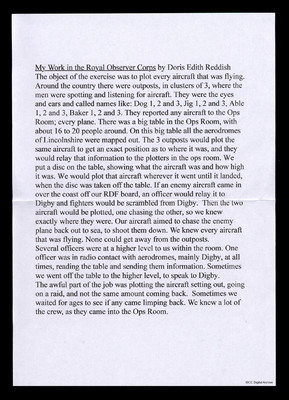My Work in the Royal Observer Corps
Title
My Work in the Royal Observer Corps
Description
Doris' experience in the Royal Observer Corps. She explains how they would record an aircraft. They recorded all aircraft.
Creator
Coverage
Language
Format
One typewritten sheet
Publisher
Rights
This content is available under a CC BY-NC 4.0 International license (Creative Commons Attribution-NonCommercial 4.0). It has been published ‘as is’ and may contain inaccuracies or culturally inappropriate references that do not necessarily reflect the official policy or position of the University of Lincoln or the International Bomber Command Centre. For more information, visit https://creativecommons.org/licenses/by-nc/4.0/ and https://ibccdigitalarchive.lincoln.ac.uk/omeka/legal.
Contributor
Identifier
BReddishDEReddishDEv1
Transcription
My Work in the Royal Observer Corps by Doris Edith Reddish
The object of the exercise was to plot every aircraft that was flying. Around the country there were outposts, in clusters of 3, where the men were spotting and listening for aircraft. They were the eyes and ears and called names like: Dog 1,2 and 3, Jig 1,2 and 3, Able 1, 2 and 3, Baker 1, 2 and 3. They reported any aircraft to the Ops Room; every plane. There was a big table in the Ops Room, with about 16 to 20 people around. On this big table all the aerodromes of Lincolnshire were mapped out. The 3 outposts would plot the same aircraft to get an exact position as to where it was, and they would relay that information to the plotters in the ops room. We
put a disc on the table, showing what the aircraft was and how high it was. We would plot that aircraft wherever it went until it landed, when the disc was taken off the table. If an enemy aircraft came in over the coast off our RDF board, an officer would relay it to Digby and fighters would be scrambled from Digby. Then the two
aircraft would be plotted, one chasing the other, so we knew exactly where they were. Our aircraft aimed to chase the enemy plane back out to sea, to shoot them down. We knew every aircraft that was flying. None could get away from the outposts. Several officers were at a higher level to us within the room. One officer was in radio contact with aerodromes, mainly Digby, at all times, reading the table and sending them information. Sometimes we went off the table to the higher level, to speak to Digby. The awful part of the job was plotting the aircraft setting out, going on a raid, and not the same amount coming back. Sometimes we waited for ages to see if any came limping back. We knew a lot of the crew, as they came into the Ops Room.
The object of the exercise was to plot every aircraft that was flying. Around the country there were outposts, in clusters of 3, where the men were spotting and listening for aircraft. They were the eyes and ears and called names like: Dog 1,2 and 3, Jig 1,2 and 3, Able 1, 2 and 3, Baker 1, 2 and 3. They reported any aircraft to the Ops Room; every plane. There was a big table in the Ops Room, with about 16 to 20 people around. On this big table all the aerodromes of Lincolnshire were mapped out. The 3 outposts would plot the same aircraft to get an exact position as to where it was, and they would relay that information to the plotters in the ops room. We
put a disc on the table, showing what the aircraft was and how high it was. We would plot that aircraft wherever it went until it landed, when the disc was taken off the table. If an enemy aircraft came in over the coast off our RDF board, an officer would relay it to Digby and fighters would be scrambled from Digby. Then the two
aircraft would be plotted, one chasing the other, so we knew exactly where they were. Our aircraft aimed to chase the enemy plane back out to sea, to shoot them down. We knew every aircraft that was flying. None could get away from the outposts. Several officers were at a higher level to us within the room. One officer was in radio contact with aerodromes, mainly Digby, at all times, reading the table and sending them information. Sometimes we went off the table to the higher level, to speak to Digby. The awful part of the job was plotting the aircraft setting out, going on a raid, and not the same amount coming back. Sometimes we waited for ages to see if any came limping back. We knew a lot of the crew, as they came into the Ops Room.
Collection
Citation
Doris Reddish, “My Work in the Royal Observer Corps,” IBCC Digital Archive, accessed July 8, 2024, https://ibccdigitalarchive.lincoln.ac.uk/omeka/collections/document/28307.
Item Relations
This item has no relations.

